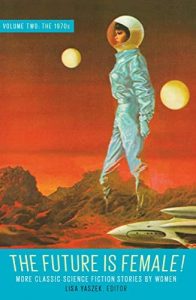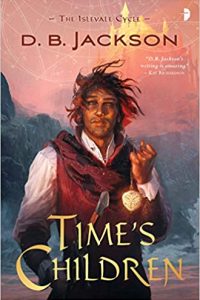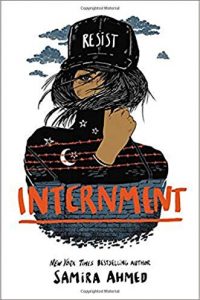Alexandra Pierce Reviews The Future is Female! Vol 2: the 1970s: More Classic Science Fiction by Women edited by Lisa Yaszek
 The Future is Female! Vol 2: the 1970s: More Classic Science Fiction by Women, Lisa Yaszek, ed. (Library of America 978-1-59853-732-1, $27.95, 450 pp, hc) October 2022.
The Future is Female! Vol 2: the 1970s: More Classic Science Fiction by Women, Lisa Yaszek, ed. (Library of America 978-1-59853-732-1, $27.95, 450 pp, hc) October 2022.
I scraped into the 1970s with just a couple of months to spare and, although I’ve done a fair amount of reading from the time, I’m not going to claim any expertise in assessing what is the best, or even what is representative, of the era. Lisa Yaszek, however, can. Her exceptional Galactic Suburbia: Recovering Women’s Science Fiction (2008) set out to examine the science fiction written by women since 1945, while 2016’s Sisters of Tomorrow: The First Women of Science Fiction looked at women contributing to science fiction in a multitude of ways in the very early years of SF publishing. To fill in the middle, as it were, the first volume of The Future is Female! (2018) showcased “Women’s Science Fiction Stories from the Pulp Era to the New Wave”, so the 1920s to 1960s. And now we have this: 23 stories from the 1970s.
In her introduction, Yaszek identifies the early 1970s as a moment of change for women in science fiction. Numbers don’t suggest that there were proportionately more women, but rather that they were becoming more visible – winning more awards, for instance, as one metric. There was also, in line with the politics of the day, an increasing sense of a feminist mode of writing. Yaszek points to specific women whose work she considers significant and places them in their context: the women who were already important from the 1960s; LGBTQ+ and BIPOC women who wrote challenges to the straight and white norms of, primarily, the United States of America. She uses their own writing to note how and why these women came to enjoy and write science fiction, and while the specific titles might be different, I dare say many 21st-century authors have very similar origin stories. Yaszek also acknowledges the hardships many of these women faced in having their stories taken seriously, as well as noting those men who actively promoted their work. Yaszek’s introduction in general is a wonderful look at the history of the 1960s and ’70s, and the ways that politics broadly understood affected on the science fiction and popular culture scenes, and vice versa.
Arranged chronologically, the stories start with 1971’s “Bitching It” (Sonya Dorman Hess) and end with Connie Willis in 1979, with “Daisy, in the Sun.” There are some stories that were familiar to me from historical and best-of anthologies: Joanna Russ’s “When It Changed”; Vonda N McIntyre’s “Of Mist, and Grass, and Sand”; James Tiptree Jr’s “The Girl Who was Plugged In”; Ursula K. Le Guin’s “The Day Before the Revolution”; Raccoona Sheldon’s “The Screwfly Solution”; Lisa Tuttle’s “Wives”. Just these alone show the range of stories collected here, from Russ’ threatened all-female utopia, to Tiptree’s proto-cyberpunk, to Tuttle’s nightmarish aliens-used-as-women story. Across all 23 stories, there is – unsurprisingly! – a huge range of themes, and settings, and styles. Some of them do address ideas that can arguably be identified as “female,” although that’s been increasingly (and appropriately) problematized; I think more accurate would be to say that they deal with issues of the subaltern. Some stories could, I think, as easily have non-gendered main characters: Chelsea Quinn Yarbro’s “Frog Pond”, for instance, and Pamela Sargent’s “If Ever I Should Leave You”. Miriam Allen deFord’s alien protagonist in “A Way Out” identifies as male, as does Kathleen M Sidney’s in “The Anthropologist”, and both explore issues of gender and sexual identity. While I would classify very few (if any) of the stories as actively joyful, some definitely dip into dystopian, perhaps especially for the woman reader: Lisa Tuttle’s “Wives” is up there as one of the more horrifying of the era, for my money; the world of Kate Wilhelm’s “The Funeral” becomes more horrifying the further you read; Tiptree’s “The Girl who was Plugged In” is remorseless in its dehumanization of P. Burke.
I like that Yaszek doesn’t make claims for these 23 stories to be “the best” or even necessarily the most representative of the 1970s. Her introduction suggests that they do fit into what she sees as three important changes to the genre brought by the feminist authors of the time: a broader use of the all-female utopia; a broader vision of women as characters, beyond the stereotypes of “modest maidens… beautiful bitches, faithful wives, and so on” (xxvii); and broadening perspectives on “science, society, and sexuality” (xxviii). As such, they are an excellent introduction to themes and ideas that have influenced much of the 21st century’s science fiction. Beyond their historical importance, though, these remain captivating and compelling stories in their own right; brought together, this is an anthology for any reader of short science fiction.
Alexandra Pierce reads, writes, podcasts, cooks and knits; she’s Australian and a feminist. She was a host of the Hugo Award winning podcast Galactic Suburbia for a decade; her new podcast is all about indie bookshops and is called Paper Defiance. Alex has edited two award-winning non-fiction anthologies, Letters to Tiptree and Luminscent Threads: Connections to Octavia E Butler. She reviews a wide range of books at www.randomalex.net.
This review and more like it in the December 2022 issue of Locus.
 While you are here, please take a moment to support Locus with a one-time or recurring donation. We rely on reader donations to keep the magazine and site going, and would like to keep the site paywall free, but WE NEED YOUR FINANCIAL SUPPORT to continue quality coverage of the science fiction and fantasy field.
While you are here, please take a moment to support Locus with a one-time or recurring donation. We rely on reader donations to keep the magazine and site going, and would like to keep the site paywall free, but WE NEED YOUR FINANCIAL SUPPORT to continue quality coverage of the science fiction and fantasy field.
©Locus Magazine. Copyrighted material may not be republished without permission of LSFF.








Took me awhile to track it down, but I did. The cover was first on D. G. Compton’s “Farewell, Earth’s Bliss,” 1966, Ace Books, and was by Karel Thole, if the information I tracked down online is accurate. Recognized it right off.